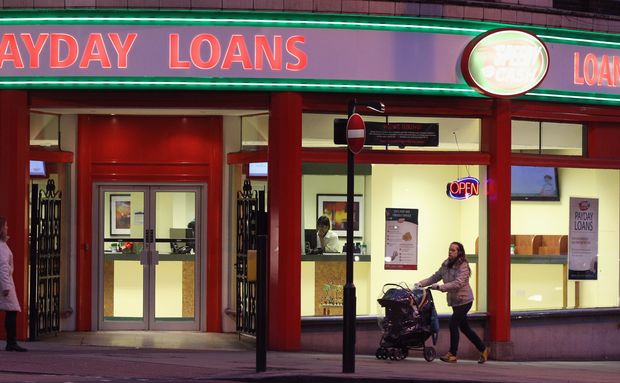
Interest rates on payday loans will be capped in Nevada, following passage of a measure on the Nov. 3, 2020 ballot. On average, payday lenders charge 400% interest on the small-dollar loans nationally.
Oli Scarff/ Getty Images
Nebraska voters overwhelming chose to put limits on the interest rates that payday lenders can charge — making it the 17th state to limit interest rates on the risky loans. But consumer advocates cautioned that future protections related to payday loans may need to happen at the federal level because of recent changes in regulations.
With 98% of precincts reporting, 83% of voters in Nebraska approved Initiative 428, which will cap the annual interest charged for delayed deposit services, or payday lending, at 36%. On average, payday lenders charge 400% interest on the small-dollar loans nationally, according to the Center for Responsible Lending, a consumer advocacy group that supports expanded regulation of the industry.
By approving the ballot measure, Nebraska became the 17th state in the country (plus the District of Columbia) to implement a cap on payday loans. The overwhelming vote in a state where four of its five electoral votes will go to President Donald Trump — the state divides its electoral votes by congressional district, with Nebraska’s second district voting for former Vice President Joe Biden — shows that the issue could garner bipartisan support.
“This is not a lefty, out-there, high-regulation state,” said Noel Andrés Poyo, executive Director of the National Association for Latino Community Asset Builders, a Latino-owned business advocacy group.
“The people of Nebraska are not on average very big about limiting the financial services industry,” Poyo added. “But when you ask evangelical Christians about payday lending, they object to it.”
Read more: For desperate Americans considering a payday loan, here are other options
Industry officials argued that the ballot measure would impede consumers’ access to credit, and said that the rate cap makes it such that lenders will not be able to operate in the state.
“It amounts to eliminating regulated small-dollar credit in the state while doing nothing to meet Nebraskans’ very real financial needs, including amid the COVID-19 pandemic and economic downturn,” said Ed D’Alessio, executive director of INFiN, a national trade association for the consumer financial services industry.
The ballot measure’s success in Nebraska could presage similar efforts in other states. Other states that have capped the interest payday lenders charge in recent years via ballot measures like Nebraska’s include Colorado and South Dakota.
“This transcends political ideology,” said Ashley Harrington, federal advocacy director at the Center for Responsible Lending. “There is just something wrong with triple digit interest rates and trapping people in cycles of debt.”
The experiences in those states add further support behind initiatives to cap interest on small-dollar loans. In South Dakota, the volume of unsecured and payday alternative loans offered by credit unions, which are subject to an 18% and 28% rate cap, has grown considerably since the ballot measure passed in 2016, research has shown. And polls indicate continued support of the interest rate cap on payday loans among a vast majority of South Dakotans.
Federal regulators have loosened limits on the payday lending industry
Despite the measure’s success in Nebraska, changes occurring at the federal level could weaken efforts to regulate the payday-lending industry and cap the interest rates it charges.
In July, the Consumer Financial Protection Bureau issued a new rule rescinding provisions of a 2017 rule that mandated that payday lenders must determine whether a person will be able to repay their loans. Critics of the payday industry have long argued that the high interest rates the loans carry cause people to fall into debt spirals, whereby they must borrow new loans to pay off existing payday loans.
NALCAB, which is being represented by the Center for Responsible Lending and Public Citizen, filed a lawsuit in federal court last week against the CFPB looking to overturn the new rule.
Meanwhile, the Office of the Comptroller of the Currency, which regulates national banks, last month finalized the so-called “true lender” rule. This new regulation allows non-bank lenders, such as payday lenders, to partner with banks to offer small-dollar loans. Because the loans would be made through the bank, they would not be subject to state-based interest rate caps. Critics have called the new regulation a “rent-a-bank” scheme and argue it could harm consumers.
“It’s not a loophole, it’s a gaping tunnel,” Poyo said, in criticizing the OCC’s new regulation.
If Democrat Joe Biden wins the presidential election, his administration would take over leadership of both the CFPB and the OCC and could rescind these new policies, Poyo said.
However, Harrington argued that the federal government should go a step further and create a federal cap on interest rates. Even if control of Congress remains divided between Democrats and Republicans, Harrington said lawmakers should look to the success of the ballot measures in Nebraska and South Dakota as inspiration.
“Everyone should be able to get behind safe, affordable consumer loans that don’t have triple-digit interest rates,” Harrington said.










Add Comment